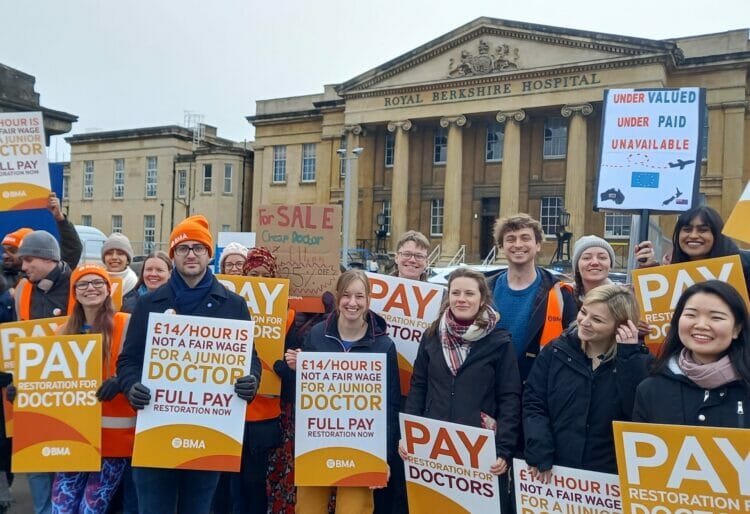JUNIOR doctors in Reading joined those around the country entering the third day of strikes today, joining teachers, rail staff, and civil servants in one of the biggest days of industrial action seen in the UK.
It also comes as Chancellor Jeremy Hunt is set to lay out his budget plans, and concludes 72 hours of strikes contesting conditions and pay.
Junior doctors say they have seen a real-terms pay cut of 26% since 2008 and the British Medical Association is seeking a 35% increase.
They constitute around 40% of the medical workforce, as the term includes recent graduates as well as many who have been practising for a number of years.
Health Secretary Steve Barclay has said that the pay increase would be “completely unaffordable” despite assurances that he would see a fair settlement.
Matt Bilton, Chair of the Thames Valley arm of the British Medical Association, was among those protesting outside the Royal Berkshire Hospital.
He said: “Doctor’s pay has been eroded– by failing to keep up with inflation over the past 15 years to the tune of 26%.
“We don’t think that doctors are worth a quarter less than 15 years ago.
“What it would take from the government is to invest properly in the NHS, and the NHS is its staff.”
He says that the BMA has estimated the cost would be “approximately £1 billion” to bring doctors to parity with 2008.
He explains: “That would mean doctors who are in their first year of work, currently earning £14 an hour, being paid an extra five pounds, and we think that that is worth it to retain staff in the NHS.
“We are short of doctors across the UK– we currently have approximately eight-and-a-half thousand vacancies.
“Meanwhile, every day I see adverts asking me to come to Australia and New Zealand to work, and I have a number of colleagues who are who have already made that decision.”
Health Secretary Steve Barclay said that he was “disappointed” in the decision to take strike action, and laid out estimates that the pay rise would cost around £2 billion.
Mr Barclay invited members of the BMA to talks late on Friday, March 10– an invitation which was declined, with the BMA citing the lateness of the talks and “completely unacceptable” preconditions to negotiations.
Mr Barclay said it was “incredibly disappointing that unions declined my offer,” and he urged them to “come to the negotiating table.”
Mr Bilton said that conditions in the medical sector are: “really difficult, and have been for a while.
“From day one, it’s an extraordinary amount of responsibility in an incredibly under-resourced setting, and you feel unable to give the level of care that you wish to.
“Inadequate staffing leads to a feeling of constantly being behind and always at risk of making a potentially catastrophic error.”
He continued: “It’s an incredibly stressful environment to work in with huge amounts of responsibility, and the pay just isn’t commensurate with that.”
Chancellor Jeremy Hunt did not go on to cover any provisions for medical workers in the budget when he laid plains out in Parliament.























